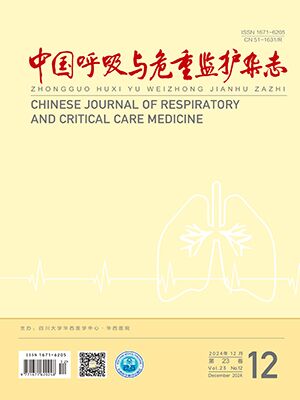| 1. |
中华医学会呼吸病学分会慢性阻塞性肺疾病学组. 慢性阻塞性肺疾病诊治指南(2013 年修订版). 中华结核和呼吸杂志, 2013, 36(4): 255-264.
|
| 2. |
Hibi T, Nii H, Nakatsu T, et al. Crystal structure of gamma-glutamylcysteine synthetase: insights into the mechanism of catalysis by a key enzyme for glutathione homeostasis. Proc Natl Acad Sci USA, 2004, 101(42): 15052-15057.
|
| 3. |
Kumar S, Kasturia N, Sharma A, et al. Redox-dependent stability of the γ-glutamylcysteine synthetase enzyme ofEscherichia coli: a novel means of redox regulation. Biochem J, 2013, 449(3): 783-794.
|
| 4. |
林书典, 戴爱国, 徐平. 慢性阻塞性肺疾病患者 γ 谷氨酰半胱氨酸合成酶活性及表达的变化. 中华结核和呼吸杂志, 2005, 28(2): 97-101.
|
| 5. |
Yoshida T, Sugiura H, Mitobe M, et al. ATF3 protects against renal ischemia-reperfusion injury. J Am Soc Nephrol, 2008, 19(2): 217-224.
|
| 6. |
Gilchrist M, Henderson WR JR, Clark AE, et al. Activating transcription factor 3 is a negative regulator of allergic pulmonary inflammation. J Exp Med, 2008, 205(10): 2349-2357.
|
| 7. |
Miyamoto N, Izumi H, Miyamoto R, et al. Transcriptional regulation of activating transcription factor 4 under oxidative stress in retinal rigment epithelial ARPE-19/HPV-16 cells. Invest Ophthalmol Vis Sci, 2011, 52(3): 1226-1234.
|
| 8. |
刘晓燕, 戴爱国, 李洁. 转录因子 ATF3 和 ATF4 在大鼠慢性阻塞性肺疾病中的表达及作用. 中国呼吸与危重监护杂志, 2011, 10(2): 121-125.
|
| 9. |
Garcia-Lujan R, Conde-Gallego E, Lopez-Rios F, et al. Analysis of the molecular expression profile of non small cell lung carcinoma associated to chronic obstructive pulmonary disease. Histol Histopathol, 2009, 24(4): 417-423.
|
| 10. |
Wang IM, Stepaniants S, Boie Y, et al. Gene expression profiling in patients with chronic obstructive pulmonary disease and lung cancer. Am J Respir Crit Care Med, 2008, 177(4): 402-411.
|
| 11. |
Li J, Dai AG, Hu RC, et al. Positive correlation between PPARγ, PGC-1α and γ-GCS in lungs of rats and patients with chronic obstructive pulmonary disease. Acta Biochim Biophys Sin, 2010, 42(9): 603-614.
|
| 12. |
Ray S, Watkins DN, Misso NL, et al. Oxidant stress induces gamma-glutamylcysteine synthetase and glutathione synthesis in human bronchial epithelial NCI-H292 cells. Clin Exp Allergy, 2002, 32(4): 571-577.
|
| 13. |
林书典, 周巧玲, 戴爱国. GSH 在 COPD 大鼠肺内合成机制和作用的研究. 中国热带医学杂志, 2007, 7(7): 1071-1072, 1120.
|
| 14. |
Olala LO, Choudhary V, Johnson MH, et al. Angiotensin II-induced protein kinase D activates the ATF/CREB family of transcription factors and promotes StAR mRNA expression. Endocrinology, 2014, 155(7): 2524-2533.
|
| 15. |
Kim KH, Jeong JY, Surh YJ, et al. Expression of stress-response ATF3 is mediated by Nrf2 in astrocytes. Nucleic Acids Res, 2010, 38 (1): 48-59.
|
| 16. |
Gustems M, Woellmer A, Rothbauer U, et al. c-Jun/c-Fos heterodimers regulate cellular genes via a newly identified class of methylated DNA sequence motifs. Nucleic Acids Res, 2014, 42(5): 3059-3072.
|
| 17. |
Bakin AV, Stourman NV, Sekhar KR, et al. Smad3-ATF3 signaling mediates TGF-beta suppression of genes encoding Phase Ⅱ detoxifying proteins. Free Radic Biol Med, 2005, 38(3): 375-387.
|
| 18. |
Wang C, Li H, Meng Q, et al. ATF4 deficiency protects hepatocytes from oxidative stress via inhibiting CYP2E1 expression. J Cell Mol Med, 2013, 18(1): 80-90.
|




